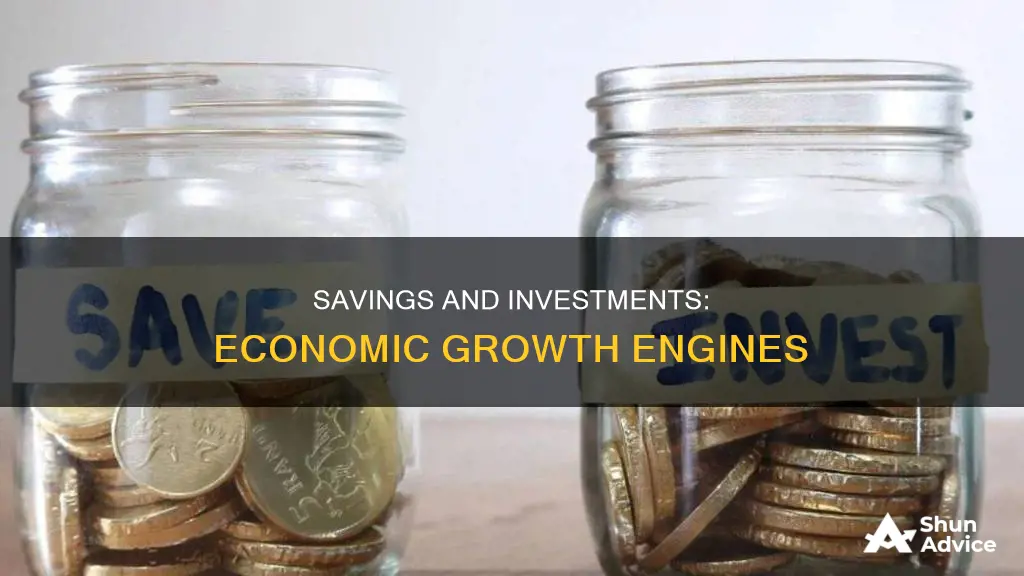
Savings and investments are important for economic growth as they stimulate investment, production, and employment, generating greater sustainable economic growth. Savings can be understood as consuming less in the present in order to consume more in the future. In the context of an economy with a single commodity, such as corn, saving means that the commodity is immediately planted (invested), yielding more in the future. This increases the stock of capital, which in turn can be consumed or saved. In the long term, higher savings can help finance higher levels of investment and boost productivity. However, in the short term, a rapid rise in savings can cause a fall in consumer spending, potentially leading to a recession.
What You'll Learn
- Savings stimulate investment, production, and employment, generating sustainable economic growth
- Higher savings rates can speed up a country's economic recovery
- Savings help consumers cope with financial hardship, which in turn aids the economy's recovery
- Savings reduce the need for government stimulus packages
- Savings and investments are key factors in determining economic growth rates

Savings stimulate investment, production, and employment, generating sustainable economic growth
Savings are essential to promoting economic growth, as they stimulate investment, production, and employment, leading to sustainable economic development. Savings provide the financial capital necessary for investments, which, in turn, drive innovation and productivity. This causal link between savings and economic growth has been the subject of extensive research by renowned economists.
The relationship between savings and economic growth is particularly evident in developing countries like Kosovo, which has experienced significant economic transformation. The increase in savings in Kosovo has positively impacted its economic growth, with higher savings rates leading to faster economic growth. This is because savings create additional income streams, providing countries with greater opportunities for production and innovation. For instance, savings in banks can be lent out to businesses to invest in modern production lines, machinery, and technology, which help reduce production costs, increase productivity, and enhance competitiveness.
Moreover, savings can reduce a country's dependence on foreign direct investment, decreasing the risks associated with volatile foreign investment. Countries with higher national savings rates are less reliant on external sources of funding, maintaining their independence and avoiding coercive policies that may misuse their resources. Additionally, savings can help mitigate the negative impact of economic downturns. During tough economic times, savings act as a cushion for consumers, helping them manage unexpected expenses without accumulating debt.
However, it is important to note that while savings are crucial for long-term economic growth, a rapid increase in savings over a short period can lead to a decrease in consumer spending, potentially causing a recession. This paradox, known as the "Paradox of Thrift," highlights that while savings are generally beneficial, a sudden increase in savings across the entire population can lead to a drop in aggregate demand and economic stagnation. Therefore, it is essential to balance savings with consumption to avoid economic downturns.
In summary, savings play a vital role in stimulating investment, production, and employment, leading to sustainable economic growth. They provide the financial capital necessary for investments, reduce dependence on foreign investment, and help consumers weather economic downturns. However, it is crucial to manage savings rates to avoid negative short-term impacts on the economy.
Investing in Startups: Where to Begin?
You may want to see also

Higher savings rates can speed up a country's economic recovery
A country's economic recovery can be accelerated by higher savings rates, which have a significant positive impact. This is especially true in developing countries, where the largest source of financial capital is savings deposited in commercial banks.
During tough economic times, having money saved can be invaluable for both individuals and the nation as a whole. While saving is generally good advice regardless of economic conditions, it is even more crucial when the economy is struggling.
Personal savings are essential not only for an individual's financial well-being but also for the country's economic recovery. When the national savings rate is high, recovery tends to be faster. This is because higher savings rates provide a cushion for consumers to absorb unexpected expenses without falling into debt. Additionally, a larger portion of income allocated to savings means lower living expenses, allowing consumers to adjust their budgets and spend more on mortgage payments or compensate for job losses.
Furthermore, higher savings rates can reduce a country's dependence on foreign direct investment, decreasing the risks associated with volatile foreign investment. This was demonstrated in a case study on Kosovo, which experienced significant economic growth due to increased savings rates.
However, it is important to note that there is a delicate balance between savings and consumption. While higher savings rates can speed up economic recovery, excessive savings can also lead to reduced consumption, which may result in decreased economic growth.
In summary, while saving is important, it should be balanced with prudent spending to ensure a healthy economy. Nevertheless, during challenging economic periods, higher savings rates can play a crucial role in speeding up a country's recovery.
Bloom Investing: Is it Free to Access?
You may want to see also

Savings help consumers cope with financial hardship, which in turn aids the economy's recovery
Savings help consumers cope with financial hardship, which, in turn, aids the economy's recovery. This is especially true when the economy is in recession or depression.
Personal savings are not just crucial for an individual's financial well-being; at the national level, when the rate of personal savings is high, economic recovery tends to be faster. This is because higher savings reserves mean that consumers have cushions that can help absorb overwhelming expenses without digging the hole deeper. In addition, having a higher portion of income allocated to savings means that living expenses are lower, and consumers can adjust their budgets to spend a larger chunk of income on increased payments or compensate for job losses.
This ability to cope with financial hardship ultimately means that the economy recovers much faster. When bills are being paid, the banks, utilities, and grocery stores can keep their doors open and their workers employed.
The importance of savings is further highlighted when considering the negative consequences of a lack of savings. For example, in the two decades between 2000 and 2020, many Americans started using their credit lines and home equity as if they were savings accounts. This led to a prevalence of credit defaults, which caused the economic downturn in 2008, known as the Great Recession. As the credit market seized and consumer credit lines began to shrivel, people started to realise that credit limits were not the same as cash in the bank. This chain reaction of defaults cut economic output and increased job losses, impacting those whose savings were already depleted.
Furthermore, savings can help reduce a country's dependence on foreign investment and decrease the risk arising from volatile foreign direct investment. For instance, a study on the impact of savings on economic growth in Kosovo found that savings stimulate investment, production, and employment, generating greater sustainable economic growth. The study recommended that developing countries like Kosovo should implement policies encouraging citizens to save in banks to promote economic growth.
Reliance Industries: Invest Now?
You may want to see also

Savings reduce the need for government stimulus packages
During an economic downturn, those with savings are able to continue paying their bills, and spending money on essentials such as groceries, utilities, and rent. This means that businesses can keep their doors open and retain their employees. In this way, savings at a consumer level can stabilize demand and boost spending, which are effective responses to a recession.
In addition, savings can reduce the risk of inflation. Inflation can be said to be the number-one killer of savings. With inflation, each dollar in savings has less real purchasing power. When there are high rates of inflation, one unit of currency is not capable of purchasing the same amount of goods as in a prior period. Therefore, a high rate of savings can help to control inflation.
Furthermore, savings can reduce the need for foreign investment, which can create an economic dependence on lenders, increasing the risk of foreign currency exchange. For example, a study on the impact of savings on the economy of Kosovo found that savings had a significant positive impact on the country's economic growth, meaning that the risk arising from volatile foreign direct investment decreased significantly.
Finally, savings can reduce the need for individuals to rely on credit, which can lead to a prevalence of credit defaults, as seen in the 2008 economic downturn, now referred to as the Great Recession. When there is a high level of personal savings, individuals are less likely to rely on credit to make purchases or to treat as a savings account.
Strategic Financial Investments: Navigating the Path to Prosperity
You may want to see also

Savings and investments are key factors in determining economic growth rates
The impact of savings on economic growth is particularly evident in developing countries, where the largest source of financial capital comes from savings deposited in commercial banks. For example, a study on the impact of savings on economic growth in Kosovo found a positive correlation between deposits and economic growth. The study concluded that an increase in savings in commercial banks positively affects sustainable growth. Similarly, a study by Solow in 1956 stressed the importance of saving for economic growth, arguing that larger savings result in higher investments and increased production.
Investments are also crucial for economic growth. In economics, it is said that the level of savings equals the level of investment. When people save more, banks can lend more money to firms for investment. This investment helps boost productivity and economic growth over the long term. However, in the short term, a rapid rise in savings can cause a fall in consumer spending, potentially leading to a recession. Therefore, it is important to balance savings and consumption to promote economic growth.
Personal savings are not just essential for an individual's financial well-being but also play a crucial role in a country's economic recovery. During economic downturns, higher savings reserves give consumers a cushion to absorb unexpected expenses without falling into debt. Additionally, having a higher portion of income allocated to savings means lower living expenses, allowing consumers to adjust their budgets to compensate for any financial setbacks. This ability to cope with financial hardship ultimately leads to a faster economic recovery.
In summary, savings and investments are indeed key factors in determining economic growth rates. They stimulate investment, production, and employment, boost productivity, and provide financial stability for individuals and nations alike. However, it is important to note that a balance between savings and consumption is necessary to avoid recessions and promote sustained economic growth.
Retirement Homes: The Smart Investment for a Secure Future
You may want to see also
Frequently asked questions
Saving money can help economic growth in several ways. Firstly, it encourages people to consume less in the present so that they can consume more in the future. This deferred consumption allows for the accumulation of financial capital, which can then be invested in production and innovation, leading to greater economic growth. Additionally, savings can help absorb unexpected expenses without the need to borrow money, reducing an individual's reliance on credit and the risk of defaulting on loans.
Investments promote economic growth by increasing the stock of capital in an economy. This can be understood by considering an economy with a single commodity, such as corn. Saving corn by planting it in the ground (investing) yields more corn in the future. Similarly, in a modern economy, investments in assets such as stocks, bonds, or real estate can generate profits and create long-term growth.
Savings and investments are closely linked, as savings provide the funds needed for investments. When people save more, banks have more deposits available to lend to businesses for investment purposes. This increases investment in the economy, which is a key factor in determining economic growth rates. However, it is important to note that in the short term, a rapid increase in savings can lead to a decrease in consumer spending, potentially causing a recession. Therefore, the relationship between savings, investments, and economic growth is complex and depends on various factors such as interest rates, confidence, growth, and expectations.







